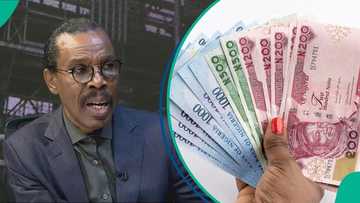Naira Weakens Past ₦1,540/$ as Dollar Demand Overwhelms CBN Supply in FX Market
- The Nigerian currency, the naira, has crossed a new threshold in the official foreign exchange market
- The naira depreciated to a level never seen in months due to a decline in forex interventions by the Central Bank of Nigeria (CBN)
- Analysts explained that the spike was caused by strong demand for the USD, with spot rates touching an intraday high of ₦1,543
Legit.ng’s Pascal Oparada has reported on tech, energy, stocks, investment and the economy for over a decade.
The naira depreciated sharply at the Nigerian Foreign Exchange Market (NFEM) on Tuesday, crossing ₦1,540 per US dollar for the first time in months.
Central Bank data showed the official rate closing at ₦1,537.90, weaker than Monday’s ₦1,535.92.

Source: Getty Images
The spike was driven by strong corporate demand for the greenback, with spot rates touching an intraday high of ₦1,543.
This came despite the Central Bank of Nigeria (CBN) injecting $150 million into the market in two tranches last week in an attempt to ease demand pressure.
Analysts told MarketForces Africa that the high intraday rate signals a possible return of the CBN to the market with fresh FX sales in the coming days.
CBN may step up interventions
“The number doesn’t look good; demand is clearly heating up again,” forex trader said.
This view aligns with the pattern observed in recent weeks, where persistent dollar shortages have kept the naira under pressure, forcing the apex bank to consider more aggressive interventions.
FX inflows decline for the third week
Market data revealed that FX inflows into the official window dropped for the third consecutive week, falling to $732.8 million from $911.1 million in the previous week.
This decline has reduced available supply, making it harder for the CBN to meet surging demand.
A breakdown of inflows showed:
- Non-bank corporates: $295.0 million (largest share)
- Foreign Portfolio Investors (FPIs): $267.9 million
- Exporters: 19.45% of inflows
- Individuals: 0.45% of inflows
- Other international sources: 3.19% of inflows
External reserves cross $40 billion
In a surprising twist, Nigeria’s external reserves rose to $40.229 billion — the first time since January they have crossed the $40 billion mark.
Analysts attribute this to sustained foreign portfolio inflows and robust participation from non-bank corporates.
While higher reserves could provide the CBN with more firepower to defend the naira, market watchers caution that without a sustained boost in FX supply, the currency will remain vulnerable.
Outlook: Short-term volatility likely
Market Forces Africa reported that with corporate demand still strong and inflows falling, the naira is expected to face more short-term volatility.
The CBN’s strategy in the coming days, whether to sell more dollars or allow the rate to adjust, will be key to determining the next market direction.

Source: Getty Images
For now, traders and businesses are bracing for continued swings in the exchange rate as Nigeria navigates the twin challenges of rising demand and limited supply in the FX market.
Naira nears an equal exchange rate
Legit.ng earlier reported that the naira’s depreciation against the US dollar in the Nigerian Foreign Exchange Market (NFEM) has led to the convergence of official and parallel market rates.
Data from the Central Bank of Nigeria (CBN) shows that on Thursday, July 17, 2025, the gap between the official and black market windows settled at less than N2.
Source: Legit.ng





